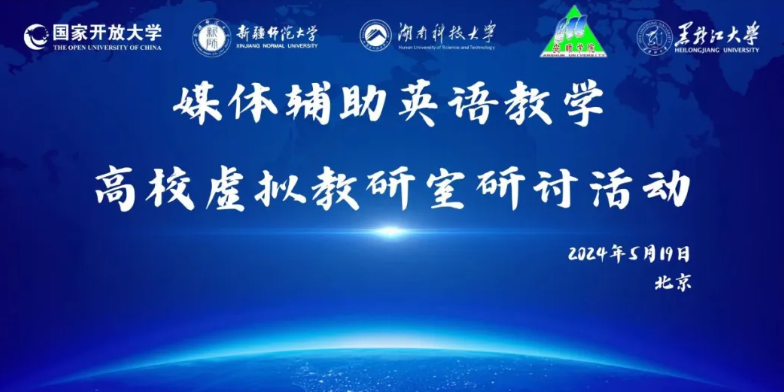 The Open University of China (OUC) recently hosted an online symposium on media-assisted English language learning programme for higher education virtual teaching and research office.
The Open University of China (OUC) recently hosted an online symposium on media-assisted English language learning programme for higher education virtual teaching and research office.
This event brought together experts, scholars, and educators from nearly a hundred higher education institutions, including OUC branches, Xinjiang Normal University, Hunan University of Science and Technology, Guizhou Anshun University, Heilongjiang University, Shenzhen Polytechnic University, Xi'an Jiaotong University, Nanjing Agricultural University, University of Nottingham (UK), China University of Petroleum (Beijing), and Gansu Longdong University.

Zheng Jipeng, dean of the School of Foreign Languages at the OUC, commended the efforts of the media-assisted English language learning programme for the higher education virtual teaching and research office, and outlined strategic directions for its future growth. Han Yanhui, the head of this virtual office, provided an operational overview since its inception in August 2022 and summarised the significant milestones achieved.
Professor Hu Dan from Zhongnan University of Economics and Law delivered a lecture titled "The Metaphorical Roles of LLM in Foreign Language Teaching Research." He detailed the evolution, capabilities, and human-like characteristics of LLM (Large Language Models) and analysed how LLM assumes roles of "personification, objectification, and environmental simulation" in foreign language education. Professor Hu explored the impact of these metaphorical roles on the conventional practices of "teaching, learning, and research," and how they redefine the triadic relationship among "teachers, students, and the learning environment." He also emphasised the ethical considerations in deploying LLM across various educational scenarios. Discussants Jia Wen, an associate professor at Nanjing Agricultural University, and Cao Ning, an associate professor at Gansu Longdong University, enriched the discussion with insightful contributions.
Lian Jingjing, an associate professor at Beijing University of Posts and Telecommunications (BUPT), delivered a lecture centred on "Design and Practice of AI-Enhanced Academic English Teaching Cases". She delineated her participation experience in the AI-Assisted English Teaching Competition among Beijing Higher Education Institutions, walked the audience through the design and production process of the competition video, and engaged in a thoughtful exploration of integrating artificial intelligence into academic English instruction to fulfill educational objectives and enhance teaching excellence. Zhang Yang, an associate professor at Heilongjiang University, and Zhang Yangyang, a doctoral candidate at the University of Nottingham, served as discussants, contributing vibrant dialogues that enriched the lecture's content.
The roundtable forum was moderated by Associate Professor Ding Hui from China University of Petroleum. The forum held in-depth discussions on the topic of "Can AI Disrupt (Foreign Language) Education?" Scholars from various backgrounds engaged in a comprehensive discussion, examining the potential influence of AI on educational models, teaching methods, and learning assessments, while also considering the appropriate management of human-machine relationships based on their own teaching and research experiences. Professor Han Yanhui delivered the closing remarks, endorsing the event and extending heartfelt gratitude to the experts and scholars who shared their insights.
The participants uniformly echoed that the symposium was immensely beneficial, fueling their enthusiasm for the future integration of AI in foreign language education. Professor Han Yanhui outlined his intention to continue organising such events, aiming to elevate the standard of English teaching in open education, foster academic exchanges among open universities and conventional higher education institutions, and sustain the innovative progress of foreign language education within the AI era.
By Qin Chun, Li Chengcheng, Han Yanhui, Hu Lanxi, OUC